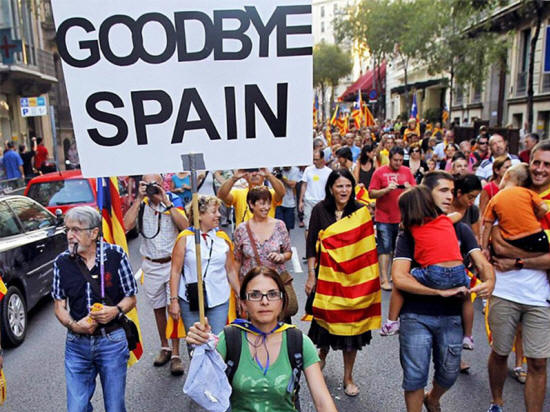|
November 3, 2017 from WolfStreet Website
is like sand in the gears
of the local economy.
...are in the dock, which is
happening with disturbing regularity these days.
After just a few hours of hearing preliminary evidence, the National Court Judge sent half of Catalonia's suspended government to jail without bail.
On Friday, the same judge issued an international arrest warrant for Carles Puigdemont, the disputed Catalan president who fled to Brussels on Monday, as well as four other former ministers who did not show up to court on Thursday.
Catalonia's separatist politicians are paying a very high price for overplaying their hand.
As we warned months ago, many in the Catalan government had hoped that threatening to declare independence unilaterally, or even following through on the threats (which it kind of did on Friday), might be enough to push the Spanish government into having to compromise.
It was a massive bluff, and it's hugely backfired.
But while jailing Catalonia's elected government may be justifiable by Spanish law and will probably go some way to placating the more revanchist elements of the Spanish public, it will also further inflame tensions and polarize divisions within Spain's north eastern region while doing yet more damage to the tattered image of Spanish democracy in the rest of the world.
It also risks exacerbating economic uncertainty and instability in Catalonia, Spain's richest region.
Just when things appeared to be returning to some semblance of normality as local people and the region's political parties turned their attention to the regional elections scheduled for December 21, Rajoy, his government, and the judges they help appoint just lit a fuse under the region.
In Catalonia today it's virtually impossible to tell what will happen tomorrow, let alone this time next month or next year.
Such acute uncertainty is like sand in the gears of the local economy. Rather than slowing, the exodus of Catalan-based companies to other parts of Spain has actually accelerated in the wake of Madrid's activation of article 155 of Spain's constitution.
On Tuesday alone an additional 99 companies bid farewell to Catalonia, albeit merely on paper for now.
Spain's central bank yesterday warned that the current crisis could, in the worst case scenario, end up shaving 2.5 percentage points off Spain's GDP in the next two years.
That could be very optimistic if a genuine, lasting solution is not found to this crisis soon - and preferably one that does not involve the government in Madrid criminalizing a political movement supported by roughly half the region's population.
The greatest tragedy of all, as British-Spanish journalist John Carlin wrote yesterday in the Barcelona daily La Vanguardia, is just how "spectacularly unnecessary" the current conflict is and how easily it could have all been avoided:
Instead, what we have is a constant escalation of tensions from a government majority ruled by a party (Popular Party) that is implicated in over 60 major political scandals - more than just about any other governing party in Europe.
And yet, even as the party continually falls on the wrong side of the law, the EU holds it up as a defender of the rule of law.
Spain's Premier Mariano Rajoy recently become the first sitting prime minister to appear as a witness in a Spanish court when he gave evidence in a massive corruption case involving the alleged illegal financing of his Popular Party.
One of the dozens of companies embroiled in the Popular Party's kickback scandals is Indra, a semi state-owned tech giant that organizes the vote counting for virtually all of Spain's political elections, including Catalonia.
The company is alleged to have paid Rajoy's party €600,000 of public funds diverted through a complex network of shell companies. The scandal barely graced the front pages of Spain's newspapers.
Now Indra gets to organize the vote counting for Catalonia's do-or-die elections in December.
For years, this sort of corruption has consistently ranked as the second biggest cause for concern after unemployment in Spain. Now, it's the prospect of Catalan independence that's at the forefront of people's minds.
It's the perfect smokescreen for,
...that the government has systematically plundered to plug some of its own massive fiscal shortfalls.
In short, Spain's economy is perhaps not as robust as recent growth figures may suggest.
Unemployment, already at 17.1%, surged by 58,000 in October as the number of highly seasonal tourist-dependent jobs began shrinking. Market-entry salaries are 14% lower than they were in 2008.
Worse still, the economy's recent show of strength was based on three main pillars:
And all of these pillars are beginning to show signs of strain.
As tensions continue to rise in Catalonia, the economic uncertainty digs in for the long haul...
|



